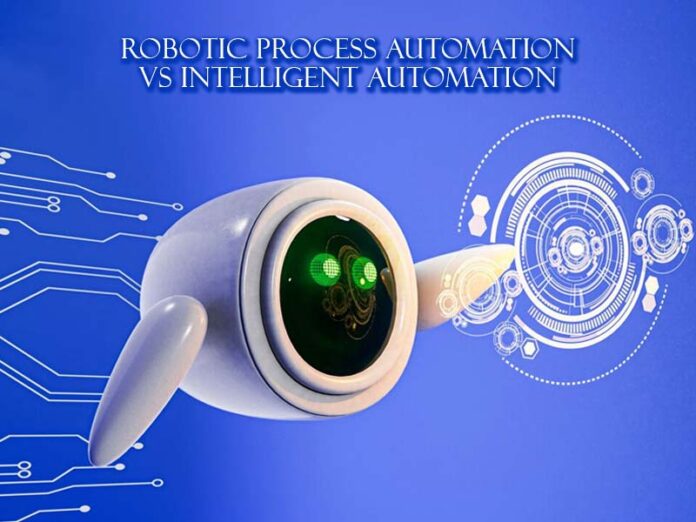20% of new startups fail when they are in their initial stages. You need to hire a team that manages all your business processes. But what will you do if your budget is in tight mode? Do you hire a team? You will have to spend multiple lakhs to hire a team. Do you want to spend that much money, especially when you have the option to leverage automation technologies to manage all your work?
These automation tools are of many types, such as RPA and IA. Both of these automation technologies have many similarities and differences. Let’s unfold this article bit by bit to explore robotic process automation vs intelligent automation.
Define the Robotic Process Automation vs. Intelligent Automation with an Example
Let’s explore the definitions of RPA and IA with examples.
What Exactly is RPA?
RPA refers to robotic process automation, mainly used for automating routine tasks such as data entry, analysis, visualization, and creating a report based on the given data. The technology behind RPA comprises the use of robots, or, as you can say, “bots,” that are fully capable of mimicking human activities and sufficiently performing repetitive routine-based activities.
Benefits of Implementing RPA
There are many benefits to incorporating RPA into your business operations. Let’s check in detail.
- Time-Saving Technology: With robotic process automation, you can get rid of daily repetitive tasks such as data entry, analysis, and many more. RPA technology is very proficient in performing all these daily tasks very well.
- Zero Error: Errors suck, and it takes a lot of time to recheck and correct all errors. But with the assistance of RPA, you can easily automate your task, further reducing the chances of errors.
- More Secure: Cybersecurity is the biggest concern. When you use RPA to automate tasks, it ensures that the task is executed in a fully secure manner, which reduces the chances of a data breach or any kind of cyber threat.
What Exactly is IA?
IA refers to intelligent automation; it is more advanced as compared to robotic process automation (RPA). Intelligent automation comprises many advanced technologies, such as artificial intelligence, natural language, or machine learning. Intelligent automation uses all these technologies to perform complex tasks such as decision-making processes, mining, and managing workflow.
Benefits of Implementing IA
In the above section, you explore the benefits of RPA. Now let’s check how intelligent automation is beneficial for your business.
- Decision-Making Process: Intelligent automation is very effective in making decisions based on raw or unstructured data, such as creating summaries based on surveys or any insights. This will save a huge amount of time for any team working on databases.
- Increase Productivity: When you implement IA in performing decision-based tasks, you can focus on performing other tasks. In that way, you get time to focus on more work.
- Improved Customer Experience: The top priority for every business is to make their customer experience smoother and happier. But sometimes, due to a complex workflow, it’s very hard to deal with customers. However, intelligent automation is very proficient in reducing task time spent and making sure to follow proper instructions to smooth the workflow.
How is RPA Different from IA?
When it comes to the capabilities of both automation software, IA is far better than RPA. Intelligence automation software can easily perform all the tasks RPA can, but RPA is not capable enough to perform tasks that IA does.
Let’s understand this with some assumptions.
Suppose you want to analyze survey data and make summaries. How will you do that? Using IA! Right? Because RPA does not have the capability to perform high-intelligence tasks such as creating summaries or decision-making tasks.
Which one to Choose: Robotic Process Automation vs. Intelligent Automation?
It can be confusing when you have to make a choice, especially when both are efficient automation technologies.
When Choosing Robotic Process Automation (RPA)
If your task is repetitive, structured, and routine-based, it’s better to choose RPA. It works best to perform repetitive tasks.
When Choosing Intelligent Automation (IA)
If you are dealing with unstructured, complex tasks requiring human-like interaction, opting for intelligent automation (IA) is suggested.
Which process would benefit from the use of Robotic Process Automation?
Robotic process automation (RPA) is proficient in handling tasks such as data entry, data transfer, visualization, data analysis, and managing stocks. It is also very helpful in updating customer profiles.
Conclusion
In a nutshell, both automation technologies have huge differences, but they are both very effective at automating any task. As we discussed earlier, RPA is mainly employed for performing repetitive or routine tasks. On the other hand, intelligent automation (IA) is quite proficient in performing high-intelligence-based tasks such as decision-making tasks. With a proper understanding of their differences and functions, you can easily choose the automation software that works best for your business process.
FAQs About Robotic Process Automation vs. Intelligent Automation
Ques 1. Which is more complex RPA or IA?
Ans. RPA is better for automating repetitive tasks such as data sorting and visualization. But if your task is complex, it’s better to incorporate intelligent automation (IA) into your workflow.
Ques 2. Is RPA more expensive than IA?
Ans. No! Intelligent automation (IA) is far more expensive than RPA. The reason is that intelligent automation (IA) has advanced capabilities to perform complex tasks such as creating human-like responses, summaries, etc., which RPA can’t be able to do.
Ques 3. Will AI replace RPA?
Ans. Both AI and RPA are automation tools that are quite helpful in automating any task. AI comes with more advanced features that RPA doesn’t have. There is a chance that in the future, both AI and RPA will be used together instead of replacing each other.
Ques 4. How do IA and RPA differ?
Ans. RPA is mostly employed for performing tasks that are repetitive and in structured form, while IA has more advanced features and can efficiently handle unstructured, typical tasks that require decision-making skills.
We hope this article will be helpful to you. Stay tuned for upcoming articles.
READ MORE: Robot Diagram: A Visual Guide to Robotics!
If you like our article, please subscribe to BsyBeeDesign for the latest updates on design. If we forget anything, share your creative ideas in the comments section.
Follow us on Facebook, Linkedin, Instagram, Pinterest and YouTube.


































